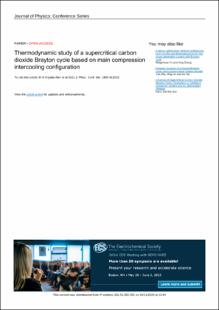Thermodynamic study of a supercritical carbon dioxide Brayton cycle based on main compression intercooling configuration
...
Orjuela Abril, Martha Sofia | 2021-06-09
This study presents detailed thermodynamic modeling of a supercritical Brayton cycle
operating with carbon dioxide as a working fluid for electric power generation. The study
incorporates a main compression intercooling configuration while elucidating the effect of
operational parameters on the overall performance based on energy and exergy perspectives. The
model was carefully validated with relevant authors. Moreover, two different optimization
methodologies, namely particle swarm optimization and fmincom, are evaluated based on
convergence criteria. The results demonstrated that the fmincom reduced the iteration time
between 140 s - 180 s. The cycle pressure played a central role in the stability of the
thermophysical properties of the working fluid. The energy and exergy efficiencies present a
direct relation with the inlet temperature. The air cooling and regenerators represent the biggest
contributor to exergy destruction, whereas the compressors featured minimal impact on the
exergy degeneration. Overall, the proposed configuration demonstrated robust performance to
implement with high-grade heat sources, especially in non-interconnected areas.
LEER










